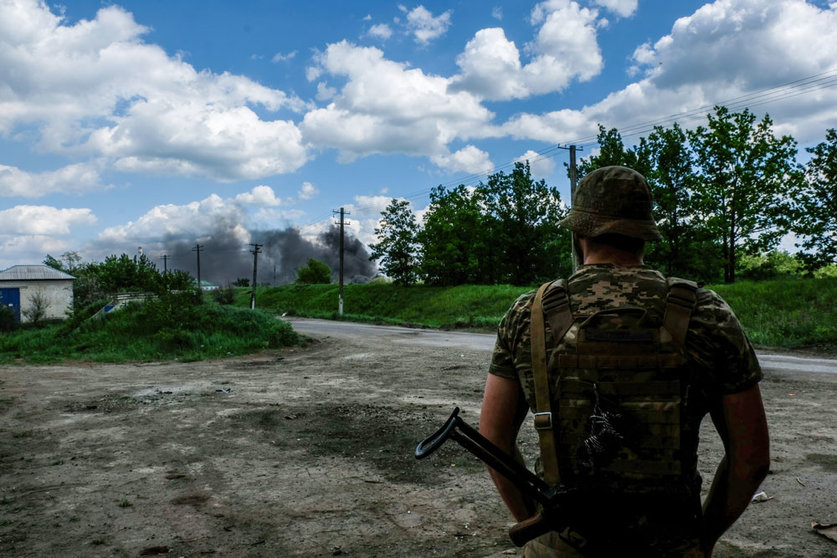Three men, two British and one Moroccan, who fought alongside Ukrainian forces have been sentenced to death by the top court in the self-proclaimed Donetsk People's Republic, an area of eastern Ukraine controlled by Russian-backed rebels.
Russian news agency TASS reported the trio were found guilty on Thursday of "participating in hostilities on the side of the Ukrainian armed forces in the capacity of mercenaries."
Russian officials have stated that they regard foreigners fighting for Ukraine as mercenaries and, therefore, international laws protecting prisoners of war do not apply.
British Foreign Secretary Liz Truss condemned the death sentences handed to British citizens Aiden Aslin, 28, and Shaun Pinner, 48, as a "sham judgment with absolutely no legitimacy."
The two had been captured by separatist forces in the south-eastern port city of Mariupol in April. Both lived in Ukraine before the war and were married to people in Ukraine, according to British media reports. After the Russian invasion, they fought with the Ukrainian army.
According to the court, the defendants, whose number also include Moroccan national Brahim Saadoun, "confessed their guilt." One of the men had also "admitted to having been trained in terrorist attacks."
The verdict by the court, which is not internationally recognized, would be appealed by the defendants, TASS reported.
Clemency
Russian media also reported that the three men have the option of petitioning the leadership of the separatist republic for clemency. If this is accepted, the death sentence could be commuted to life imprisonment or 25 years in a penal colony.
Russia has a moratorium on the death penalty, but it does not apply to the Moscow-backed separatist areas of Ukraine. According to reports, the executions could be carried out by firing squad.
Meanwhile, a Russian ground offensive continued on the eastern city Severodonetsk, which has a pre-war population of around 100,000 and sits in the eastern Ukraininan region of Luhansk.
Hundreds of civilians are seeking safety in the city's Azot chemical plant, currently being used as an air raid shelter, local Ukrainian officials said.
So far, however, it is not surrounded by Russian troops as was the case in Mariupol, when residents and Ukrainian fighters sought cover in the Azovstal steelworks and were surrounded for weeks before ultimately surrendering.
Four people have been killed so far in Russia's shelling of the Azot plant, Luhansk governor Serhii Haidai said.
Moscow, and pro-Russian separatists, have repeatedly accused Kiev of luring civilians into the basement of Azot before sowing the area with mines, although there is no evidence to support such claims.
Zelensky: 'Critical battle'
Ukrainian President Volodymyr Zelensky has described the battle for Severodonetsk as critical to the fight for the east of the country.
"Severodonetsk remains the epicentre of the clashes in the Donbass," he said in a video message.
The Ukrainian military is inflicting tangible losses on the enemy there, he said. "This is a very brutal and heavy battle. Perhaps one of the most difficult of this war ... In many ways, the fate of our Donbass will be decided there."
Pro-Russian separatists have been controlling large parts of Luhansk, as well as Donetsk, for years. The region, called Donbass, is heavily industrialized and its control would enable Russia to create a land bridge to the Crimea Peninsula, which Moscow annexed in 2014.
French President Emmanuel Macron assured Zelensky in a phone call that Paris would deliver further heavy weaponry to Ukraine, the Elysee said Thursday evening.
Ukraine's ambassador to Berlin meanwhile called for clarity from Germany on a recently promised supply of weapons.
Reconstruction support
Andriy Melnyk told Tagesspiegel Ukraine's troops urgently need to break Russia's "enormous military superiority." Germany has promised an Iris-T anti-aircraft system, COBRA radar system for tracking enemy artillery and four Mars II multiple launch rocket systems (MLRS) with a range of up to 40 kilometres from German army stocks.
With the post-war reconstruction of Ukraine in mind, the European Commission said it is to provide Ukrainian start-ups with €20 million ($21.4 million) in financing, allocating up to €60,000 per company.
The Russian destruction and occupation of research infrastructure has "heavily disrupted the existing research and innovation ecosystem in Ukraine," Ukraine's Deputy Prime Minister Olha Stefanishyna said at a press conference in Brussels.
Stefanishyna said that the funds should support "companies working to innovate solutions, services and products for rebuilding and recovery efforts of Ukraine."
"While fighting Russian military aggression, it is vital for Ukraine to look forward," European Commission President Ursula von der Leyen said in a statement. The money is to be disbursed through a call for proposals opening on June 23.










